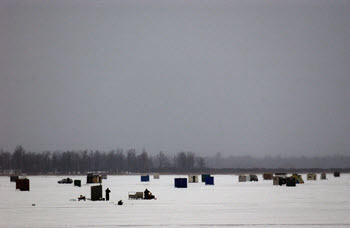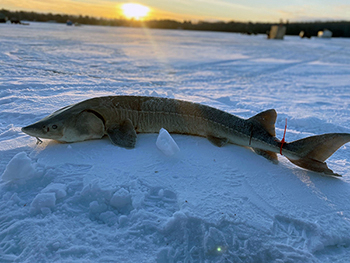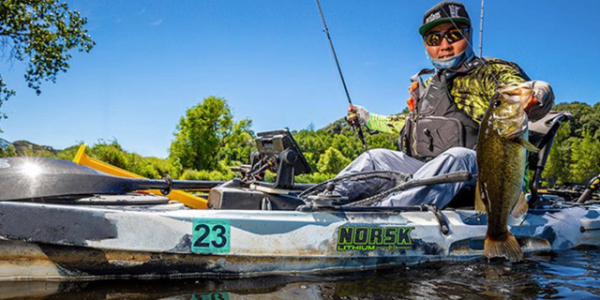Michigan: ice shanty removal dates begin this weekend for portions of Lower Peninsula

The Michigan Department of Natural Resources reminds anglers that ice shanty removal dates are quickly approaching – starting with Lake St. Clair this Sunday – and to always use extreme caution when on the ice.
Regardless of the set removal dates, changing ice conditions could require the removal of fishing shanties before those dates. This is a possibility every year, because all shanties must be removed once ice can no longer safely support them.
Shanty owners whose structures fall through the ice are subject to penalties of up to 30 days in jail, fines up to $500, or both. If a shanty is removed by a government agency, the court can require the owner to reimburse that agency for up to three times the cost of removal.
Lower Peninsula
Ice shanties on Lake St. Clair, located northeast of Detroit, must be removed before sunset Sunday, Feb. 20.
Shanties in the northern Lower Peninsula must be removed by midnight Tuesday, March 15. Those counties include Alcona, Alpena, Antrim, Arenac, Bay, Benzie, Charlevoix, Cheboygan, Clare, Crawford, Emmet, Gladwin, Grand Traverse, Iosco, Isabella, Kalkaska, Lake, Leelanau, Manistee, Mason, Mecosta, Midland, Missaukee, Montmorency, Newaygo, Oceana, Ogemaw, Osceola, Oscoda, Otsego, Presque Isle, Roscommon and Wexford.
Ice shanties in the remaining counties of the Lower Peninsula must be removed by midnight Tuesday, March 1.
Upper Peninsula
On Michigan-Wisconsin boundary waters, ice shanties must be removed by midnight Tuesday, March 15.
All other bodies of water in the Upper Peninsula must have ice shanties removed by midnight Thursday, March 31.
Daily use of ice shanties is permitted anywhere in Michigan if ice conditions permit and if the shanties are removed from the ice at the end of each day.
People venturing onto the ice should use extreme caution as temperatures begin to rise or fluctuate. The repeated thawing and refreezing of ice weakens its strength, decreasing its ability to support the additional weight of people, snowmobiles, ORVs and shanties. Deteriorating ice, water currents and high winds increase the probability of pressure cracks, which can leave anglers and others stranded on ice floes or at risk of falling through the ice.
Learn more at Michigan.gov/IceSafety.
Spring fishing
The end of ice fishing season means it is time to start preparing for spring fishing. Are you boater safety certified? In Michigan, anyone born on or after June 30, 1996, must successfully complete an approved boater safety education course to operate a vessel. Complete boater safety online at Michigan.gov/RecreationalSafety.
For more information on all fishing opportunities, go to Michigan.gov/Fishing.





